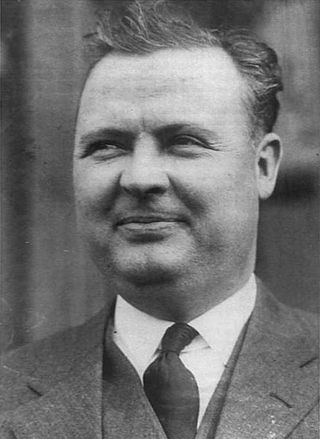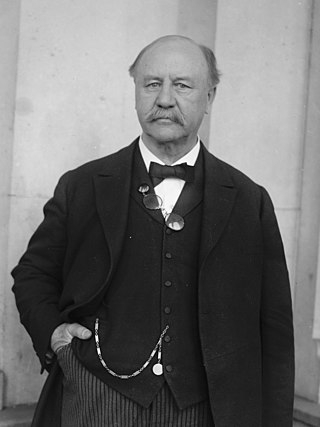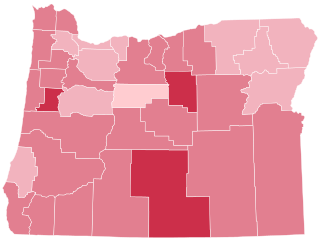
David Curtis "Steve" Stephenson was an American Ku Klux Klan leader, convicted rapist and murderer. In 1923 he was appointed Grand Dragon of the Indiana Klan and head of Klan recruiting for seven other states. Later that year, he led those groups to independence from the national KKK organization. Amassing wealth and political power in Indiana politics, he was one of the most prominent national Klan leaders. He had close relationships with numerous Indiana politicians, especially Governor Edward L. Jackson.

John Calloway Walton was an American politician and the 5th Governor of Oklahoma, serving the shortest tenure. He was impeached and removed from office shortly into his first term. A populist member of the Democratic Party, Walton previously served as the 18th Mayor of Oklahoma City between 1919 and 1923.

The governor of Oregon is the head of government of Oregon and serves as the commander-in-chief of the state's military forces. The title of governor was also applied to the office of Oregon's chief executive during the provisional and U.S. territorial governments.

Daniel James Moody Jr., was an American lawyer and Democratic politician. Originally from Taylor, Texas, he served as the 30th governor of Texas between 1927 and 1931. At the age of 33, he was elected. He took office as the youngest governor in Texas history. After his 2 terms as governor, he returned to private law practice. He continued to prosecute and represent various functions of the US government later in life.

Rufus Cecil Holman was an American politician and businessman who served as a United States senator for a single term during World War II. He was an officer in the Ku Klux Klan during the 1920s, then served as Oregon State Treasurer. He was a member of the Multnomah County Board of Commissioners.
This is a partial list of notable historical figures in U.S. national politics who were members of the Ku Klux Klan before taking office. Membership of the Klan is secret. Political opponents sometimes allege that a person was a member of the Klan, or was supported at the polls by Klan members.

Earle Bradford Mayfield was a Texas lawyer who, from 1907 to 1913, was a Texas State Senator. In 1922, he was elected to the U.S. Senate as a Democrat. He was the first U.S. Senator to be widely considered by the voters to be a member of the revived Ku Klux Klan in the 1920s. Mayfield quietly accepted KKK support but never said he had joined. He was defeated for reelection in 1928 when his opponent attacked his links to the KKK.

Samuel Moffett Ralston was an American politician of the Democratic Party who served as the 28th governor of the U.S. state of Indiana and a United States senator from Indiana.

James Withycombe was an English-born American Republican politician who served as the 15th Governor of Oregon.

Ben Wilson Olcott was an American politician of the Republican Party who served as the 16th Governor of Oregon.

Walter Marcus Pierce was an American politician, a Democrat, who served as the 17th Governor of Oregon and a member of the United States House of Representatives from Oregon's 2nd congressional district. A native of Illinois, he served in the Oregon State Senate before the governorship, and again after leaving the U.S. House. Pierce was an anti-Catholic supporter of compulsory public education and signed a law banning parochial schools, resulting in lawsuits and the United States Supreme Court case of Pierce v. Society of Sisters. He was also a eugenicist and supported Prohibition. He advocated unsuccessfully for a state income tax and vehicle license fee.

The Indiana Republican Party is the affiliate of the United States Republican Party in the state of Indiana. The chairman of the Indiana Republican State Committee is Randy Head.

Benjamin Sanford Paulen was an American banker and the 23rd Governor of Kansas from 1925 to 1929. He served as mayor of Fredonia, Kansas and in the Kansas Senate.

The Indiana Klan was the state of Indiana branch of the Ku Klux Klan, a secret society in the United States that organized in 1915 to promote ideas of racial superiority and affect public affairs on issues of Prohibition, education, political corruption, and morality. Like the rest of the KKK, it was strongly white supremacist against African Americans, Chinese Americans, and also Catholics and Jews, whose faiths were commonly associated with Irish, Italian, Balkan, and Slavic immigrants and their descendants. In Indiana, the Klan did not tend to practice overt violence but used intimidation in certain cases, whereas nationally the organization practiced illegal acts against minority ethnic and religious groups.

The 1926 Oregon gubernatorial election took place on November 2, 1926 to elect the governor of the U.S. state of Oregon. The election matched incumbent Democrat Walter M. Pierce against Republican Isaac L. Patterson and Independent candidate H. H. Stallard, who ran on an anti-Prohibition platform. Patterson won by a wide margin.

Kaspar Kap Kubli, Jr. was an American politician in the state of Oregon. Closely associated with the Ku Klux Klan, Kubli, a member of the Republican party, was elected Speaker of the Oregon House of Representatives in 1923. Among legislation passed under Kubli during his five terms of office include the Oregon Criminal Syndicalism Act in 1919.

The 1918 Oregon gubernatorial election took place on November 5, 1918 to elect the governor of the U.S. state of Oregon. The election matched incumbent Republican James Withycombe against Democratic State Senator Walter M. Pierce.

The 1928 United States presidential election in Oregon took place on November 6, 1928, as part of the 1928 United States presidential election. Voters chose five representatives, or electors, to the Electoral College, who voted for president and vice president.

The 1924 United States presidential election in Oregon took place on November 4, 1924, as part of the 1924 United States presidential election which was held throughout all contemporary 48 states. State voters chose five representatives, or electors to the Electoral College, who voted for president and vice president.

The Ku Klux Klan (KKK) arrived in the U.S. state of Oregon in the early 1920s, during the history of the second Klan, and it quickly spread throughout the state, aided by a mostly white, Protestant population as well as by racist and anti-immigrant sentiments which were already embedded in the region. The Klan succeeded in electing its members in local and state governments, which allowed it to pass legislation that furthered its agenda. Ultimately, the struggles and decline of the Klan in Oregon coincided with the struggles and decline of the Klan in other states, and its activity faded in the 1930s.





















